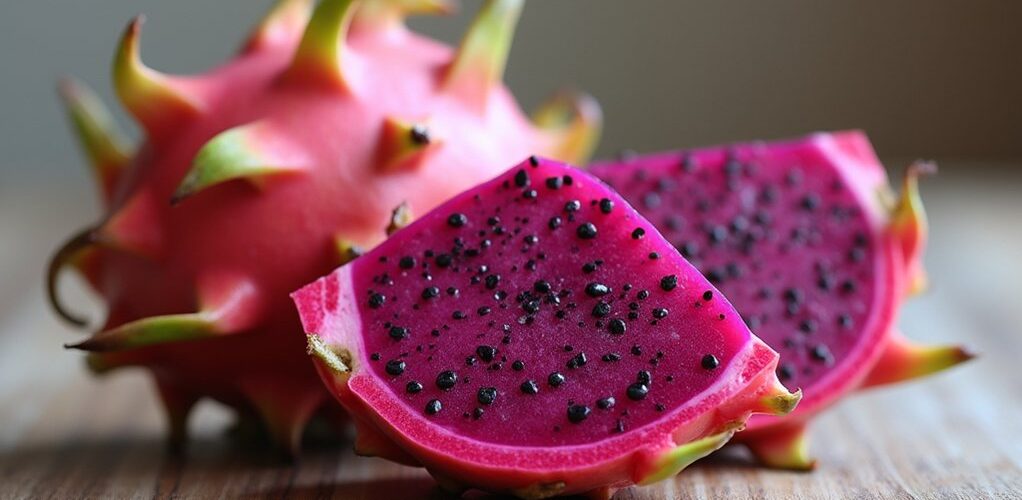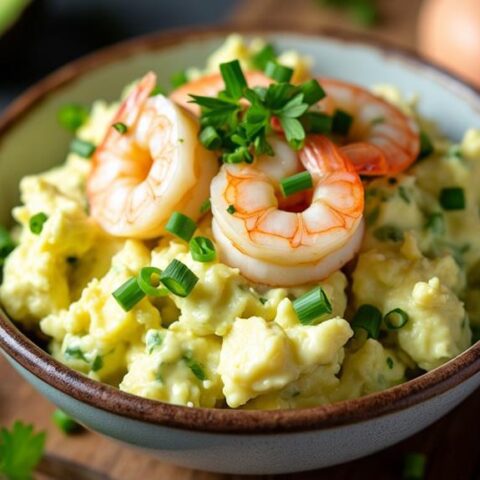
Dragon fruit contains moderate carbohydrate levels with 12 grams of total carbs per 100-gram serving, including 3 grams of fiber, resulting in 9 grams of net carbs. While not strictly low-carb, this exotic fruit offers significant nutritional benefits through its antioxidants, prebiotics, and immune-boosting compounds. Portion control allows dragon fruit to fit into many low-carb eating plans, with a typical 200-gram fruit containing 24 grams of total carbohydrates. Understanding its unique properties reveals smart strategies for incorporating this tropical delight into a balanced diet.
Key Takeaways
- Dragon fruit contains 12 grams of total carbohydrates per 100-gram serving, with 9 grams from natural sugars and 3 grams from fiber.
- After subtracting fiber, dragon fruit has 9 grams of net carbs per 100-gram portion, making it moderately low-carb.
- A typical whole dragon fruit (200 grams) contains 24 grams of total carbohydrates, requiring portion control for low-carb diets.
- Dragon fruit's carb content can fit into low-carb diets when consumed in moderation and tracked carefully.
- Create low-carb meals by pairing small portions of dragon fruit with proteins, leafy greens, or sugar-free ingredients.
What Makes Dragon Fruit Special
Dragon fruit stands out as one of nature's most visually enchanting fruits, with its striking exterior resembling the scales of a mythical dragon. This exotic fruit, native to southern Mexico and Central America, captivates both the eye and palate with its unique appearance and subtle sweetness that combines hints of kiwi and pear.
Beyond its aesthetic appeal, dragon fruit offers impressive nutritional benefits while remaining low in calories, containing just 57 calories per 100 grams.
Its array of essential nutrients includes Vitamin C, magnesium, and dietary fiber, while powerful antioxidants like betalains and hydroxycinnamates contribute to its notable health benefits. These compounds have been associated with improved glycemic control and reduced cholesterol levels, making dragon fruit an excellent choice for those seeking both nutritious and visually stunning food options.
Carbohydrate Content Analysis
A thorough analysis of dragon fruit's carbohydrate composition reveals that this exotic fruit contains approximately 12 grams of carbohydrates per 100-gram serving, with roughly 9 grams derived from natural sugars and 3 grams from dietary fiber.
When examining net carbs, which subtract fiber from total carbohydrates, dragon fruit contains about 9 grams per 100-gram portion.
This carbohydrate content becomes more significant with a typical 200-gram fruit, delivering 18 grams of net carbs, which may challenge those following strict ketogenic diets.
While dragon fruit offers nutritional benefits, individuals on low-carb diets should practice careful portion control to maintain their dietary goals.
Dragon fruit's nutritional value makes it worthwhile, but those watching carbs must monitor serving sizes to stay within their dietary limits.
Alternative fruits like strawberries or blackberries provide lower-carb options for those requiring stricter carbohydrate management.
Net Carbs Vs Total Carbs in Dragon Fruit
Dragon fruit presents distinct differences between its total and net carbohydrate content, with dietary fiber accounting for the 3-gram variance per 100-gram serving.
A standard 200-gram dragon fruit contains approximately 24 grams of total carbohydrates, which reduces to 18 grams of net carbs once fiber is subtracted. This makes portion control essential for those following carbohydrate-restricted diets.
Understanding these measurements helps individuals make informed decisions about incorporating dragon fruit into their dietary plans, particularly for those adhering to ketogenic or low-carb eating protocols.
Calculating Dragon Fruit Carbs
Understanding the carbohydrate content in dragon fruit requires careful consideration of both total and net carbs, which differ markedly in their impact on dietary calculations.
A detailed breakdown reveals that dragon fruit contains varying levels of carbohydrates depending on serving size:
- 100g serving: 12g total carbs, 9g net carbs
- Regular fruit (200g): 24g total carbs, 18g net carbs
- Fiber content: 3g per 100g serving
- Sugar content: 9g per 100g serving
- Net carbs calculation: Total carbs minus fiber
For those monitoring their carbohydrate intake, portion control is essential as dragon fruit is relatively high in carbohydrates.
While the fiber content helps offset the total carb count, individuals following strict low-carb diets should carefully measure their portions to maintain their dietary goals.
Keto-Friendly Portion Guidelines
When following a ketogenic diet, accurate measurement of dragon fruit portions becomes vital due to the distinction between total and net carbohydrates. A standard serving size of 100 grams contains 12 grams of total carbs, with 9 grams of net carbs after subtracting fiber content.
For those maintaining strict carbohydrate intake on a keto diet, portion control is essential, as a typical 200-gram dragon fruit contains 18 grams of net carbs. This amount can greatly impact daily carb limits.
To effectively incorporate dragon fruit while staying in ketosis, consumers should measure portions carefully and consider lower-carb alternatives like berries when necessary.
Tracking both total and net carbs guarantees proper adherence to ketogenic guidelines while still allowing for occasional enjoyment of this exotic fruit.
Total Versus Net Impact
The distinction between total and net carbohydrates plays a significant role in evaluating dragon fruit's place in a low-carb eating plan.
Understanding these differences helps individuals make informed decisions about portion control, especially when following a ketogenic diet.
Key points about dragon fruit's carbohydrate content:
- Total carbohydrates amount to 12 grams per 100-gram serving
- Dietary fiber content is 3 grams per 100-gram portion
- Net carbs equal 9 grams after subtracting fiber content
- A typical 200-gram fruit contains 24 grams of total carbohydrates
- Net carb content in a whole fruit is approximately 18 grams
For those monitoring their carbohydrate intake, focusing on net carbs rather than total carbohydrates provides a more accurate assessment of dragon fruit's impact on blood sugar levels and ketosis maintenance.
Dragon Fruit on Popular Low-Carb Diets
Although dragon fruit offers numerous health benefits, its place in popular low-carb diets requires careful consideration due to its moderate carbohydrate content. With approximately 24 grams of total carbohydrates per typical serving, dragon fruit can greatly impact daily carb allowances on restrictive eating plans. Those following low-carb diets can still incorporate dragon fruit by implementing strategic portion control and balancing their overall carbohydrate intake throughout the day. For individuals seeking alternatives, lower-carb fruits like strawberries and blackberries provide similar nutritional value while making it easier to maintain carb restrictions. Creative solutions, such as incorporating smaller amounts of dragon fruit into smoothies or salads, allow enthusiasts to enjoy this exotic fruit while adhering to their dietary goals. Additionally, the Keto diet's unique macronutrient composition, which demands a very low carbohydrate intake, makes it more challenging for dragon fruit to fit seamlessly into such a plan, compared to other low-carb diets with more flexibility.
Health Benefits Beyond Carb Count
While dragon fruit's carbohydrate content often receives attention, its impressive antioxidant profile, including betalains and flavonoids, helps protect cells from oxidative stress and supports overall wellness.
The fruit's prebiotic properties contribute considerably to digestive health by fostering beneficial gut bacteria, which strengthens the immune system and improves nutrient absorption.
Research indicates that dragon fruit may help regulate blood sugar levels, making it a valuable addition to balanced diets, particularly for individuals managing prediabetes or insulin sensitivity.
Powerful Antioxidant Properties
Beyond its carbohydrate content, dragon fruit packs a powerful punch of antioxidants that make it a nutritionally valuable addition to any diet. Research demonstrates that its antioxidant properties combat harmful free radicals while supporting cardiovascular health and strengthening the immune system.
Studies reveal multiple health-promoting compounds in dragon fruit that provide significant benefits:
- Betalains protect cells from damage and reduce inflammation
- Hydroxycinnamates show promising anticancer potential in research
- Flavonoids enhance brain function and heart health
- Antioxidant compounds help maintain healthy cholesterol levels
- Active compounds boost immune function and fight chronic diseases
These powerful antioxidants work synergistically to protect the body's cells, making dragon fruit a valuable choice for those seeking extensive health benefits beyond basic nutrition.
Rich Prebiotic Support
Despite its carbohydrate content, dragon fruit stands out as a remarkable source of prebiotic compounds, particularly oligosaccharides, which serve as essential nourishment for beneficial gut bacteria.
The prebiotic properties of dragon fruit work synergistically with its fiber content, approximately 3 grams per 100 grams of pulp, to enhance digestive health and promote regular bowel movements.
Research demonstrates that consuming dragon fruit pulp contributes considerably to gut health through multiple mechanisms.
The fruit's oligosaccharides stimulate the growth of beneficial bacteria in the digestive system, which can strengthen immune function and improve nutrient absorption.
These health benefits of dragon fruit extend beyond basic nutrition, as the combination of fiber and prebiotics helps create an ideal environment for maintaining a balanced gut microbiome.
Blood Sugar Management Benefits
Although dragon fruit contains carbohydrates, scientific evidence reveals its remarkable potential for blood sugar management through multiple biological mechanisms.
Research demonstrates several key benefits in supporting glycemic control and metabolic health.
- Prebiotic fiber promotes beneficial gut bacteria growth, contributing to improved blood sugar regulation.
- Supports the development of insulin-producing pancreatic cells for better glycemic control.
- Shows significant impact on reducing fasting plasma glucose levels in prediabetic individuals.
- Contains antioxidants that combat oxidative stress and inflammation linked to insulin resistance.
- May help reduce insulin resistance and fatty liver conditions, according to animal studies.
The benefits of dragon fruit extend beyond its carbohydrate content, with studies indicating its potential value in supporting overall metabolic health through various physiological pathways, particularly in blood sugar management.
Choosing and Storing Dragon Fruit
Selecting the perfect dragon fruit requires attention to both appearance and texture for ideal enjoyment. When choosing dragon fruit, look for specimens with vibrant, uniform coloring and minimal blemishes. The fruit should yield slightly when pressed, indicating peak ripeness.
To maintain this unique appearance and flavor, proper storing techniques are essential. Keep dragon fruit at room temperature if planning to consume within a few days, or refrigerate in a sealed container away from strong-smelling foods.
Once cut, the fruit remains fresh for up to five days, with the option to freeze for three months.
While enjoying this exotic fruit, be mindful of potential allergic reactions, particularly for those with existing fruit sensitivities, as some cases of anaphylactic responses have been documented.
Low-Carb Recipe Ideas With Dragon Fruit
Dragon fruit's versatility shines in low-carb cooking, offering creative possibilities for health-conscious food enthusiasts.
With approximately 9 grams of net carbs per 100-gram serving, dragon fruit can be incorporated into various low-carb recipes while maintaining dietary goals.
Here are several delicious ways to enjoy dragon fruit while keeping carbs in check:
- Create a rejuvenating salad by combining diced dragon fruit with mixed greens and avocado.
- Blend into a nutrient-rich smoothie with spinach and unsweetened almond milk.
- Use as a natural sweetener in sugar-free desserts.
- Transform into colorful ice cubes for low-carb beverages.
- Mix with sugar-free yogurt or gelatin for a tropical treat.
These recipe ideas demonstrate how dragon fruit can add exotic flavor and visual appeal to low-carb dishes without compromising nutritional goals. For those following a keto diet, incorporating healthy fats such as avocados and olive oil can enhance the nutritional content of dragon fruit dishes.
Best Times to Eat Dragon Fruit
While timing isn't strictly critical for enjoying dragon fruit, certain periods throughout the day can maximize its nutritional benefits and enhance its revitalizing qualities.
Morning consumption provides an excellent boost of hydration and vitamin C, setting a nutritious foundation for the day. As a post-workout snack, dragon fruit aids recovery and supports digestion through its fiber content, making it an ideal choice for fitness enthusiasts.
Start your day with dragon fruit – a hydrating, vitamin-rich powerhouse that fuels workouts and keeps your digestion running smoothly.
Its low calorie content of approximately 57 calories per 100 grams makes it suitable for evening consumption without disrupting sleep patterns.
For best benefits, consume dragon fruit within five days of cutting to preserve its freshness and nutritional value, regardless of the chosen time of day.
Comparing Dragon Fruit to Other Tropical Fruits
Dragon fruit stands out among tropical fruits for its strikingly lower carbohydrate content, containing just 9 grams of net carbs per 100 grams compared to mangoes' 15 grams and bananas' 23 grams.
Both sweet and tart varieties of dragon fruit maintain similar carbohydrate levels, making them equally suitable for low-carb diets regardless of the season.
The year-round availability of dragon fruit in many markets, combined with its favorable carb profile when compared to guava, papaya, and pineapple, makes it an excellent choice for health-conscious consumers seeking tropical fruit options.
Carb Content Comparison Chart
Understanding how dragon fruit's carbohydrate content compares to other tropical fruits proves essential for those monitoring their carb intake.
A detailed comparison of carb content per 100 grams reveals dragon fruit as a relatively low-carb option among tropical fruits, with just 12 grams of total carbohydrates.
- Dragon Fruit: 12g carbs (9g net carbs after fiber)
- Papaya: 11g carbs
- Pineapple: 13g carbs
- Mango: 15g carbs
- Banana: 23g carbs
This comparative analysis demonstrates that dragon fruit maintains a moderate carb profile among tropical fruits.
With its 3 grams of dietary fiber reducing the net carb count to 9 grams, dragon fruit emerges as a strategic choice for those seeking lower-carb tropical fruit options.
Sweet vs. Tart Varieties
A distinctive contrast emerges when comparing the flavor profiles of various tropical fruits, with dragon fruit offering a delicate sweetness reminiscent of kiwi and pear, while other tropical varieties present more intense or tart experiences.
Among dragon fruit varieties, the red-fleshed Hylocereus polyrhizus typically delivers a sweeter taste than its white-fleshed counterpart, Hylocereus undatus, while maintaining its status as a low carb option.
At 12 grams of carbohydrates per 100 grams, dragon fruit contains considerably fewer carbs than mangoes or bananas, which can reach 15-25 grams. This combination of sweet flavor and health benefits distinguishes dragon fruit from other tropical fruits like pineapples and guavas, which tend toward tartness.
The fruit's balanced carbohydrate content and versatile nature make it an excellent choice for various dietary needs.
Seasonal Availability Analysis
While many tropical fruits have limited seasonal windows, seasonal availability patterns reveal that dragon fruit offers exceptional versatility throughout the year. Its unique cultivation on cactus plants enables resilient growth across diverse climates, distinguishing it from moisture-dependent tropical fruits.
- Northern Hemisphere harvest: June to September
- Southern Hemisphere harvest: November to March
- Extended harvest window compared to mango and pineapple
- Peak flavor during main growing seasons
- Adaptable to arid environments
Dragon fruit's strategic harvest windows complement other tropical fruits' seasonal patterns, ensuring consistent availability when alternatives may be scarce.
Unlike papaya, which varies in quality year-round, dragon fruit maintains reliable characteristics during its growing seasons, making it a dependable choice for consumers seeking tropical fruit options beyond traditional summer favorites.
Managing Portion Sizes for Low-Carb Goals
Successfully managing dragon fruit portions proves vital for individuals following a low-carb lifestyle, particularly since a whole fruit can contain up to 24 grams of total carbohydrates. Understanding proper portion sizes helps maintain a balanced carbohydrate intake while still benefiting from the fruit's valuable nutrients. For those on a strict low-carb diet, careful monitoring intake becomes important. A 100-gram serving contains approximately 12 grams of carbohydrates, with 9 grams of net carbs after accounting for fiber content. To effectively manage consumption, individuals can incorporate dragon fruit into meals alongside low-carb ingredients like leafy greens or protein sources. Additionally, utilizing dietary tracking tools helps guarantee dragon fruit consumption aligns with daily carbohydrate goals while maximizing nutritional benefits. Remember to avoid refined carbohydrates, which can significantly disrupt ketosis, when enjoying dragon fruit as part of your meal plan.
Seasonal Availability and Selection
Despite its exotic nature, dragon fruit maintains year-round availability in many markets, with peak season occurring during summer through early fall months.
Although seasonal availability varies by region, consumers can find this nutritious fruit in various retail locations, from local grocery stores to specialty markets.
When selecting dragon fruit, consider these key factors:
- Look for specimens with vibrant colors and minimal blemishes
- Test for ripeness by gently pressing the fruit, which should yield slightly
- Choose fruits that feel heavy for their size
- Store at room temperature if consuming within days
- Refrigerate in a sealed bag for up to five days of freshness
Different varieties offer varying levels of sweetness, making it worthwhile to experiment with multiple types to find your preferred option.
Alternative Low-Carb Exotic Fruits
For those following a low-carb lifestyle, several exotic fruits can serve as appealing alternatives to dragon fruit, offering unique flavors and textures with fewer carbohydrates. While dragon fruit contains 9 grams of net carbs per 100 grams, options like berries provide similar satisfaction with considerably lower carbohydrate content. Even non-traditional fruits like avocados offer exotic appeal with minimal carb impact. Incorporating these low-carb fruits can support steady blood sugar levels and enhance dietary management.
| Fruit/Alternative | Net Carbs (per 100g) | Exotic Profile |
|---|---|---|
| Dragon Fruit | 9.0g | Sweet, Mild |
| Avocado | 1.8g | Creamy, Rich |
| Romanesco | 2.0g | Nutty, Complex |
| Persimmon | 24.0g | Sweet, Honey-like |
These alternatives provide flexibility for those seeking to maintain their low-carb goals while still enjoying unique and satisfying flavors in their diet.
Frequently Asked Questions
Are Dragon Fruits Low Carb?
Dragon fruit's nutritional profile shows moderate carb content, with 12g per 100g serving. While offering health benefits, its glycemic index suggests careful serving suggestions for those monitoring carbohydrate intake.
Is Dragon Fruit an Exotic Fruit?
Dragon fruit is indeed exotic, characterized by its tropical origins, unique appearance with vibrant scales, and distinctive nutritional profile. Its health benefits and versatile culinary uses contribute to its exotic status worldwide.
Does Dragon Fruit Spike Insulin?
Dragon fruit's moderate glycemic index suggests a mild insulin response compared to other fruits. Studies indicate potential health benefits for blood sugar control through its fiber content and bioactive compounds.
What Happens to Your Body When You Eat Dragon Fruit?
Dragon fruit's nutritional profile delivers health benefits through fiber content supporting digestive health, antioxidant properties protecting cells, and essential nutrients while promoting beneficial gut bacteria and helping maintain blood sugar levels.
Conclusion
Dragon fruit stands as a viable option for those following a low-carb lifestyle, containing moderate carbohydrates that can fit within most dietary plans when properly portioned. Its rich nutrient profile, including fiber, antioxidants, and vitamins, makes it a valuable addition to a balanced diet. While not the lowest-carb fruit available, dragon fruit's unique benefits and versatility make it worth considering for health-conscious individuals seeking exotic flavors without derailing their nutritional goals.










No Comments